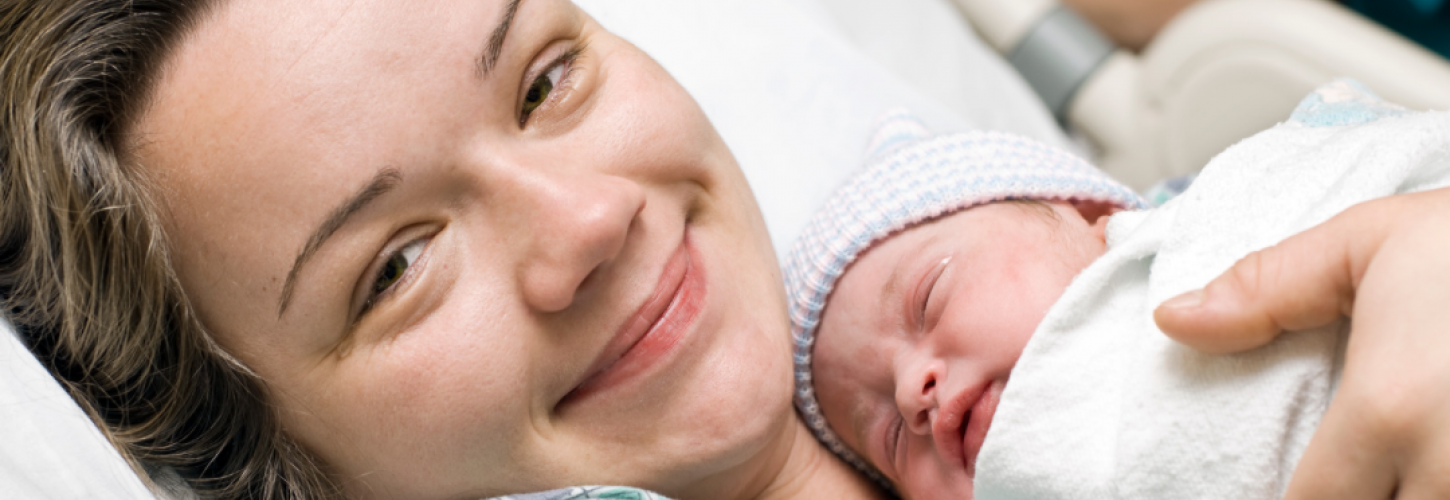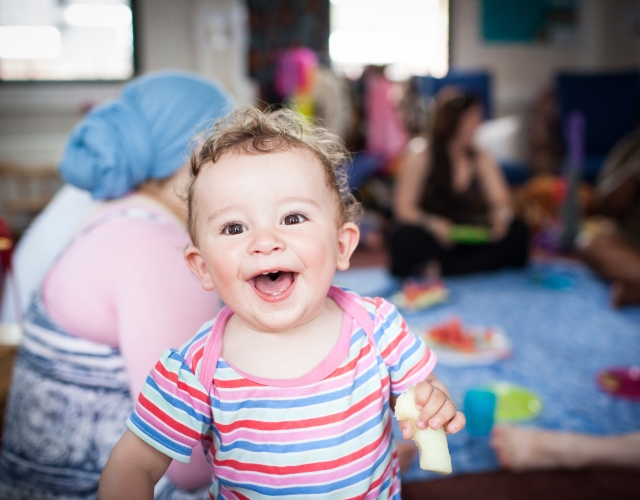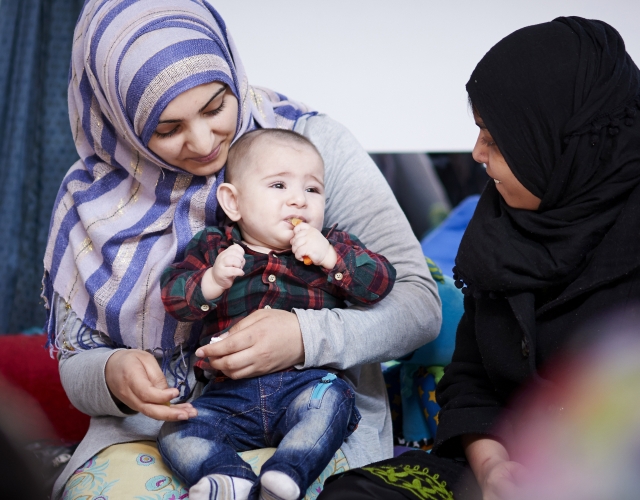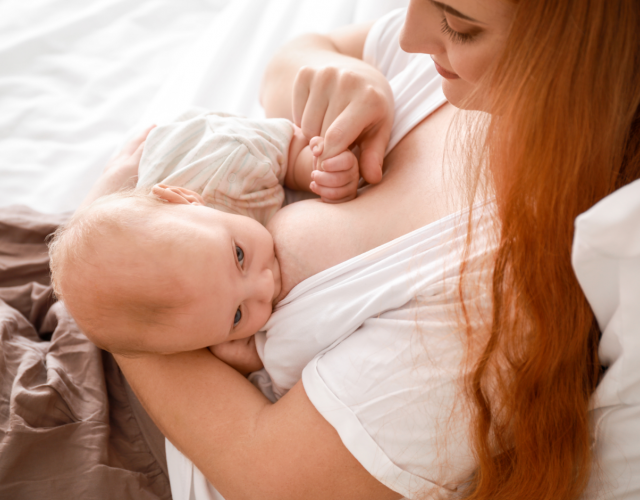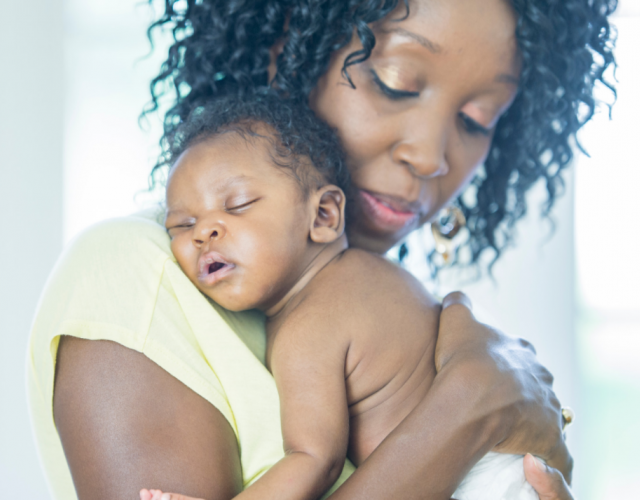Early days with baby
You'll probably spend a large part of the first few days after birth looking at your baby.
If you notice anything that worries you about your baby, however small, speak to your midwife.
Within the first 24 hours, a health professional will offer to give your baby an injection of vitamin K. This is to prevent a rare but serious blood disorder.
You will also be offered a newborn physical examination for your baby in their first 72 hours. Among other things, their eyes, heart, hips and testicles (if they have them) will be checked for possible problems.
In their first few weeks, your baby will also have the:
- Newborn blood spot test
- Newborn hearing screening
Umbilical cord care
Your newborn’s umbilical cord takes about a week to dry out and drop off. Keep it clean and dry until it does. If you notice any bleeding or discharge, tell your midwife, health visitor or GP.
In this video, a midwife explains how you can best care for your baby’s umbilical cord stump.
https://www.youtube.com/watch?v=bdOue2hKzM8
Fontanelles (soft spots)
On the top of your baby's head, near the front, is a diamond-shaped patch where the skull bones have not fused yet. There is another, smaller, soft spot towards the back of their head. These are called the fontanelles.
It will probably be a year or more before the bones close over. Do not worry about the fontanelles as they are covered by a tough protective membrane.
Your baby's skin
At birth, the top layer of your baby's skin is very thin and easily damaged. Over the first month, or longer for premature babies, your baby's skin matures and develops its own natural protective barrier.
Vernix, the white sticky substance that covers your baby's skin while in the womb, should always be left on the skin. It's a natural moisturiser that also protects against infection in the first few days.
It's best to bath your baby with plain water only for at least the first month. Do not add cleansers to your baby's bathwater or use skin lotions or medicated wipes.
Premature babies' skin is even more delicate. Staff in the neonatal unit will advise you on skincare.
If your baby is overdue, their skin may be dry and cracked. This is because all the protective vernix has been absorbed before they were born.
Eyes in newborns
Your newborn's eyes will be checked shortly after birth as part of their newborn physical examination. New babies can see, but their vision is not very focused. Their eyesight develops gradually over the first few months.
By the time your baby is 2 weeks old, you'll probably notice their eyes following your face. If they do not seem to be doing this, mention it to your health visitor or GP.
Your newborn's eyes may roll away from each other occasionally. This is called a squint and is normal in a newborn. It should go away by 3 months. Talk to your health visitor or GP if it does not.
Bumps and bruises
It's common for a newborn baby to have some swelling and bruises on their head, and perhaps bloodshot eyes.
This is caused by squeezing and pushing during birth, and is particularly common in babies who have been delivered by forceps or ventouse. It will soon disappear but, if you're worried, you can ask your midwife about it.
Birthmarks
The most common birthmarks in newborns are little pink or red V-shaped marks on the forehead, upper eyelids or neck. Some people call these stork marks or salmon patches. They gradually fade, but it may be a few months before they disappear completely.
Dark red and slightly raised strawberry marks (infantile haemangioma) are quite common. They sometimes appear a few days after birth and gradually get bigger. They may take a while to go away, but they usually disappear gradually.
Newborn spots
Spots and rashes are very common in newborn babies. They may come and go, but if you also notice a change in your baby's behaviour – for example, if your baby is not feeding well, or is very sleepy or very irritable – tell your midwife or GP immediately.
Breasts and genitals in newborns
Quite often, a newborn’s breasts are a little swollen and ooze some milk, whether they are a boy or a girl.
Your newborn's genitals may appear swollen initially but will look normal within a few weeks. Baby girls also sometimes bleed a bit or have a white, cloudy discharge from the vagina.
All this is caused by hormones passing from you to your baby before birth. Do not be concerned.
Boys' testicles develop inside their body and sometimes take a while to descend into the scrotum. A health professional will check whether they have descended as part of the newborn physical examination.
Jaundice in new babies
When they're about 2 to 3 days old, some babies develop mild jaundice. This will make their skin and the whites of their eyes look a bit yellow. It's caused by pigments released during the breakdown of old red blood cells.
It's more common in babies delivered by forceps or ventouse. It usually fades on its own within about 10 days, but more severe jaundice may need treatment.
If your baby develops jaundice in their first 24 hours, they should be checked by a health professional straight away.
Instincts in new babies
Babies are born knowing how to suck. During the first few days, they learn to coordinate their sucking with their breathing during feeding.
Newborn babies also automatically turn towards a nipple or teat if it's brushed against their cheek, and they'll open their mouths if their upper lip is stroked.
Referenced from:
https://www.nhs.uk/pregnancy/labour-and-birth/after-the-birth/getting-to-know-your-newborn/
Bonding with your baby
You will already have been bonding with your baby before they’re born - when they arrive you can bond with them in different ways. This is a time when everyone involved in the baby’s life can start to build a relationship with the baby too. If you’re not sure how to build that bond and begin a relationship with a new baby - here are a few ideas:
Skin-to-skin
One of the best ways to bond with your baby is to enjoy plenty of skin-to-skin contact. This offers baby comfort and security, so snuggle up close and enjoy the experience!
Smile all the while
A smile signals to a baby that everything is okay. Smiling is great for you too, it’ll help to flood your brain with powerful ‘feel good’ hormones that make you feel happy and help to relieve stress. In no time at all (around 6-12 weeks) your baby will be smiling back!
It’s good to talk
Those first few weeks can be both wonderful and daunting. Talking about how you are feeling can really help – and your baby is a perfect listener. Keeping your tone calm and gentle, talk to your baby about your thoughts and feelings. They’ve been listening to you for a long time already, so they’ll love hearing your voice. A little gurgle or a smile from them may be all the reassurance that you need.
Make them giggle
Speak in a funny voice, pull a silly face, play a game of peek-a-boo, whatever it takes to make your baby giggle – just go for it! When you hear your baby chortle, you will want to carry on and make them giggle even more.
Sing out loud
Hearing you sing will comfort a baby - you may not have the best voice in the world, but your baby won’t care, so go for it, sing it LOUD!
Let’s dance
Dancing while your baby watches you is a great way to relieve stress and bring you closer together. Once your baby gets a little older, you can bob and sway together -so release those feel-good hormones and have a workout too!
I'M TALKING TO YOU/ WHY ARE YOU STILL CRYING?
It can be exhausting if your baby cries constantly. You may feel that you’ve tried everything and nothing’s working. So why are they still crying? There can be several reasons why and we’ll explore a few of them here:
Colic
We know what colic is, but we don’t know what causes it. Some doctors think it’s a kind of stomach cramp. Crying often comes in waves – starting suddenly and loudly and then stopping for a moment or two. Colic can start when a baby is a few weeks old but it usually stops by the time they’re 6 months old.
Here are a few signs that your baby may have Colic:
- Hard to soothe or settle
- Clenched fists
- Bringing knees up to their tummy or arching their back
- Their tummy rumbles and/or they have lots of wind
All you can do is try and comfort your baby and wait for it to pass. Massaging their tummy can sometimes help to soothe their discomfort. Take a look at our Baby massage page.
Could my baby be ill?
If you don’t think that your baby has Colic and you can’t console or distract them, or their cry doesn’t sound like their normal cry, it could be a sign that they’re not well. Do they have a temperature or any other symptoms? If you’re at all concerned or worried, always check with your GP or Health Visitor. If you’re concerned during the night or at weekends, call NHS 111 or your GP’s out of hours number.
When to ask for urgent help
You must call 999 and ask for an ambulance if your baby:
- Has a seizure or convulsion
- Has blue, mottled, ashen (grey) or very pale skin
- Breathes rapidly, makes a throaty noise while breathing, or seems to be working hard to breathe, perhaps sucking in their stomach under their ribcage
- Has a high temperature, but their hands and feet feel cold
- Has a spotty purple-red rash anywhere on their body – this could be a sign of Meningitis
RESPONSIVE FEEDING
Feeding is a chance to feel close to your baby and get to know them. Make sure you're sitting comfortably and your back is well supported so you can enjoy holding your baby and looking into their eyes as you feed them. Feeding can sometimes take a little while, so it’s important to be comfy!
In those first few days try to limit the number of different people feeding your baby to just you and your partner – this helps make sure that your baby is bonding closely with you. There’ll be plenty of time for other members of the family and friends to cuddle the baby later!
Hold your baby quite upright for bottle feeds: support their head so they can breathe and swallow comfortably.
Brush the teat against your baby's lips and, when they open their mouth wide, let them draw in the teat. Never force the teat into their mouth, as this can harm their gums.
Always give your baby plenty of time to feed and try not to rush them.
Try to keep the teat full of milk, as this will help stop your baby from taking in lots of air during the feed.
When your baby is full they’ll pull away from the teat – lookout for this, and let them stop feeding when they’re full up.
Winding your baby
Your baby might take short breaks during a feed and may need to burp sometimes. When your baby has had enough, hold them upright with their chin over your right shoulder and their body over the centre of your chest. They should be leaning slightly to their left and slightly forward. You can gently rub or pat their back but being in this position will allow air to escape from the stomach on its own. Remember to support your baby at all times keeping on hand under their bottom and one against their back.
Useful links
https://www.healthierlsc.co.uk/BetterBirths/AfterBirth#infant%20feeding

